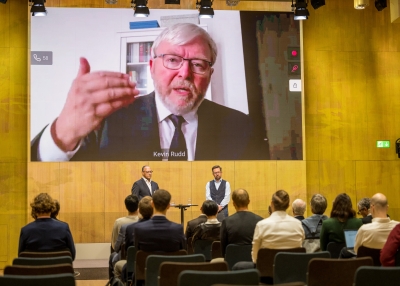Episode 1: Is China On Track?
Government Policies for Reaching Net Zero
ZURICH, October 18, 2021 — Policy consultant Hailin Wang of Sinolytics; and Hairong Huang, head of the Swiss Re Institute China Center, discuss whether China is on track to reaching its target of becoming carbon neutral by 2060. The transition from coal to renewable energy is critical to reaching this target, but it comes with a significant number of risks and uncertainties. This event is part of Climate Change in the Indo-Pacific, a four-part series by Asia Society Switzerland and Swiss Re Institute exploring the effects of climate change on the Indo-Pacific and the world. (54 min., 18 sec.)
Our key takeaways
Introduction: The cost of climate change
Climate change comes at a high economic cost, both because of its disastrous effects, as well as because of the price it will take for countries and their populations to cope with the impact of rising temperatures and unprecedented weather events. South and South-East Asia are particularly vulnerable regions.
Hairong Huang explains that by examining physical risks – including property damage, disruption to trade and the loss of productivity due to rising temperatures (potentially 2.4 degrees Celsius warmer on average by mid-century) and transition risk (the adjustment to a low carbon economy, new regulations and technology) – it is possible to assess the economic impact of climate change. Huang puts forward different options considered so far: from carbon taxing, with the most affected sectors being utilities, materials and energy; supporting the net zero transition; and promoting transparent pricing of climate related financial risks. Amongst others, the sharing of risk knowledge and expertise; as well as the establishment of standardised risk mechanisms both in the public and private sector; transparency and standardisation in data and metrics on carbon pricing (to avoid greenwashing); and financial incentives blend in with policies to adapt and mitigate climate change.
The implications of climate change in China
How China adapts to the net zero target is particularly significant because of the size of the economy and country. Whilst China is a giant greenhouse gas emitter (accounting for 28% of global emissions worldwide), Hailin Wang says that the Chinese government has worked on ambitious plans to reach the targets of the 2015 Paris Agreement. Huang comments that China has reached a second transitional point after having grown at a very rapid pace (which she aptly phrased as “from high speed to high quality transition”), and that these developments have brought many uncertainties from an economic and social standpoint.
Energy in China
Energy is a predominant topic in this session. Recently, energy shortages have caused issues across China – Wang explains that this relates to an increasing energy intensity and a shortage of coal supply in some provinces such as Guangdong. Energy intensity in China has gone up since the start of the Covid-19 pandemic due to medical necessities, and local governments failed to restrict the use of high intensity energy practices, highlighting the need for local governments to adjust their approach to decarbonisation while at the same time avoiding any type of energy rationing. Wang characterises China’s green electricity progress as ‘fantastic’ – increasing by 10% in the past ten years, and with unique subsidies that have reduced the price of solar power by 75% and of wind power by 35%, in part thanks to the localisation of supply chains.
China's green policies
Huang notes that China’s main green policies began in 2013, with a national strategy on climate change and an action plan to limit the production of coal energy in coastal areas. China has also been consistent in announcing the year 2030 as its carbon peak time. China continues to stress green financing as a main focus in its willingness to participate in the Paris Agreement. Finally, Wang emphazises that although single specific and effective policies may not exist, China is proving to be an ambitious nation that has voiced numerous climate change strategies amidst this global challenge.
Contributed by Gen A 2021 Alumna Eléonore Aubry

Hailin Wang
Consultant at Sinolytics
Hailin Wang has extensive experience researching and analyzing industrial policy and corporate performance, especially in the areas of energy policy, sustainability and environmental protection. Prior to Sinolytics, he worked at Greenpeace East Asia assessing companies’ environmental performance and multiple industrial policies.
Mr. Wang obtained a B.A. in Economics from Southwestern University of Finance and Economics (Chengdu) and holds an M.A. in Political, Legal, and Economic Philosophy from University of Bern (Switzerland). He also studied Global Legal Studies at University of Luzern and has passed CFA level I.

Hairong Huang
Head SRI Centre China, Swiss Re Institute
Hairong Huang is the Head of Swiss Re Institute China Center of Swiss Re. Prior to her assignment at SRI on Oct 2019, she was the Deputy general manager of the XIN Center of Tsinghua University, which is an innovation hub co-founded by Tsinghua University and Tel Aviv University of Israel. She also served 9 years in the property risk management area at MunichRe-North America Insurance Company. In addition, she has several years of experience in Medical research at Harvard School Public Health and Healthcare insurance area at United States Government Healthcare insurance organization.
Mrs. Huang holds M.S. in both Actuarial science and Statistics from University of Illinois at Urbana-Champaign.

